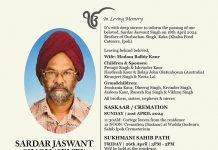A post comes up on social media – be it Whatsapp or Instagram or whatever. Immediately, someone launches an attack. At that very instant, the person runs down the other, rubbishes his or her arguments.
We have all seen it happening. In some groups, you can actually anticipate who will first launch the counter attack, and what he is going to say. People can be that predictable. Some of us get so upset that we quit discussion groups or networks.
What about you? How do you respond online? What kind of an animal are you when you’re behind the online wheels – perhaps miles away physically from the other person, seemingly safe behind the ‘protection’ of the screen? Are your actions always correct?
An author and researcher on the topic suggests that one key question to ask: Do you yearn to defend your own belief or do you yearn to see the world as clearly as you possibly can? An honest answer will help us to better understand ourselves as to how we deal with others.
I came across a TedTalk by Julia Galef where she discusses two very different mindsets, or motivated reasoning, that impact the way in which we use information and take a decision. Motivated reasoning is simply trying to make some ideas win and others lose; the drive to attack or defend ideas. It is a phenomenon where our unconscious motivations, and desires and fears shape, the way we interpret information. Some ideas come across as allies, other as enemies and we want to shoot them down. She terms motivated reasoning as ‘soldier mindset’.
Galef is president and co-founder of the California-based non-profit Center for Applied Rationality and author of ‘The Scout Mindset: See Things Clearly and Make Smarter Decisions’. She makes a persuasive argument in the video talk done in 2016. See here.
Galef picks an example from sports. I know, many of us are ardent fans of Liverpool or Manchester United or one of the British soccer clubs. When a referee makes a bad call against your team, you’re motivated to examine how he got it wrong. But if he judges that the other team committed a foul, then you’re less likely to examine the incident closely.
“Our judgment is strongly influenced, unconsciously, by which side we want to win. This is ubiquitous. It shapes how we think about our health, our relationships, how we decide how to vote, what we consider to be fair and ethical. What’s most scary about motivated reasoning or soldier mindset is that how unconscious it is. We think we’re being objective, fair minded, yet still wind up ruining a life of an innocent man,” she said.
Well, well, well. How many times have I made a decision, and convince myself that I was objective and rational. I’m sure the same goes for you. So, the question to ponder: Are we able to rise above our ingrained prejudices and unconscious biases to examine an issue for what it’s worth? It takes effort, and a strong desire to unravel truth, as unnerving as it may be.
In her presentation, Galef asks if we have the mindset of the scout: curious and open. Are you happy to allow your mind to entertain the itch to discover something beyond our existing prejudices?
Many of us sorely lack it. This is evident if we reflect on the way we conduct ourselves in discussions – in person or on the social platforms.
It comes down to how well we are grounded, she argues. It’s not how right or wrong we are on any particular topic. “Scouts are grounded. Their self-worth as a person to how right or wrong they are to any particular topic,” she underlines a point. How many times have we argued simply because we felt that our dignity or self-worth was being trampled upon.
At the end of the day, she argues that it is not about how smart you are, but how you feel.
“…if we really want to improve our judgment as individuals and as societies, what we need most is not more instruction in logic, rhetoric, probability or economics, even though those things are all valuable. What we most need to use those principles well is scout mindset,” she says.
“We need to change the way we feel. We need to learn how to feel proud instead of ashamed when we notice we might have been wrong about something. We need to learn how to feel intrigued instead of defensive when we encounter some information that contradicts our beliefs.”
Now, this is sorely lacking in many of us. Seldom do we bother to gather information from multiple sources and size them up. Usually, we live within our bubble, and feed from it. Rarely do we even recognise our inherent biases and tribal thinking. Hence, we are not prepared to accept ideas alien to our existing thinking pattern.
So, it is high time we start thinking about how we think.
 Hb Singh is a Kuala Lumpur-based journalist with some experience in dealing with Sikh organisations, both from within and outside.
Hb Singh is a Kuala Lumpur-based journalist with some experience in dealing with Sikh organisations, both from within and outside.
* This is the opinion of the writer, organisation or publication and does not necessarily represent the views of Asia Samachar.
RELATED STORY:
Power of critical thinking (Asia Samachar, 5 Jan 2021)
Go beyond your bubble (Asia Samachar, 20 Aug 2020)
ASIA SAMACHAR is an online newspaper for Sikhs / Punjabis in Southeast Asia and beyond. Facebook | WhatsApp +6017-335-1399 | Email: editor@asiasamachar.com | Twitter | Instagram | Obituary announcements, click here |

































In this period of social media broadcasts where people only hear what they want to hear, this is an excellent and timely call for our minds to stay open.